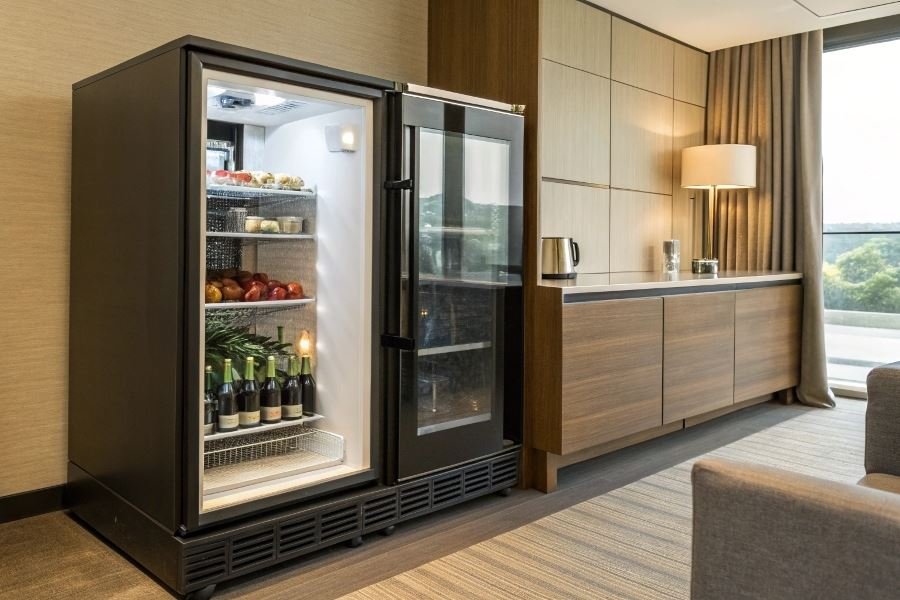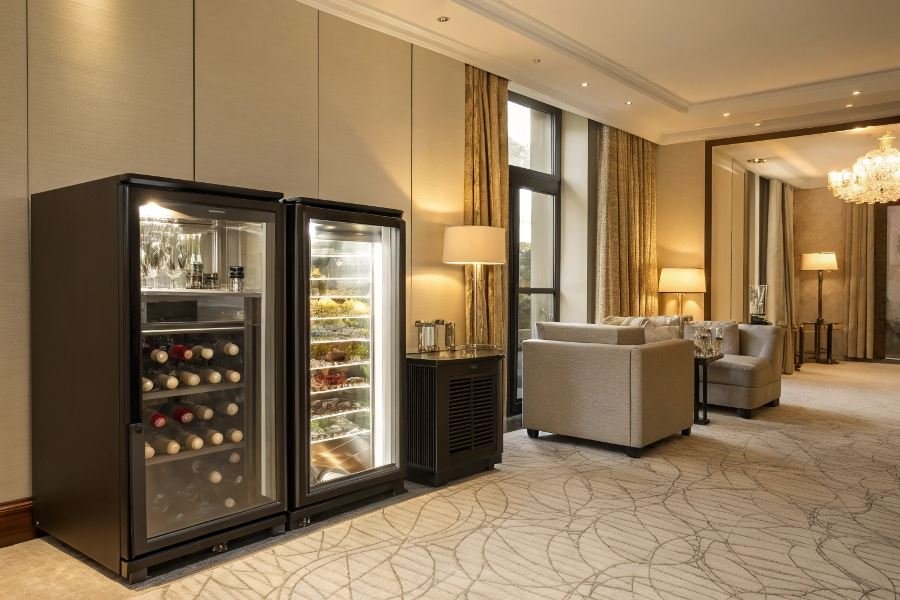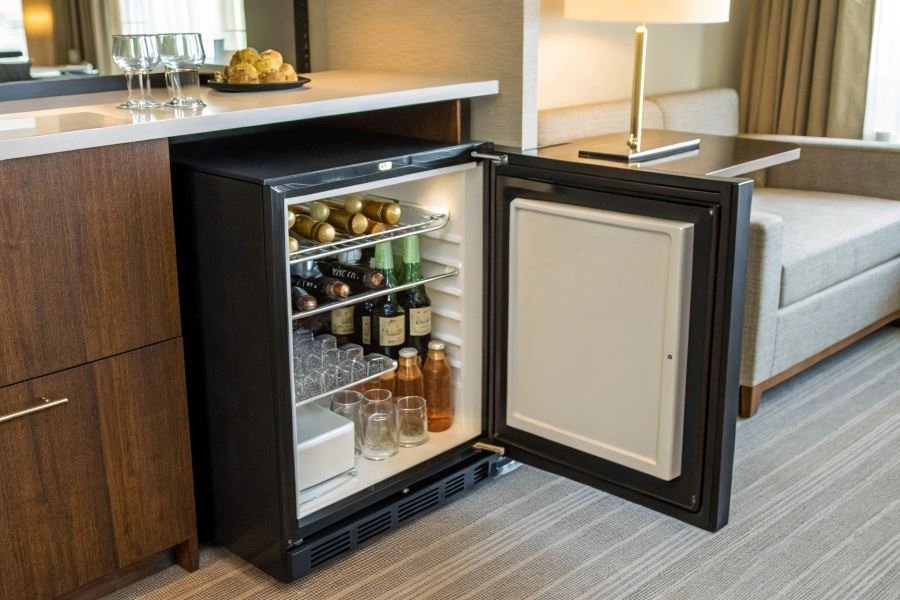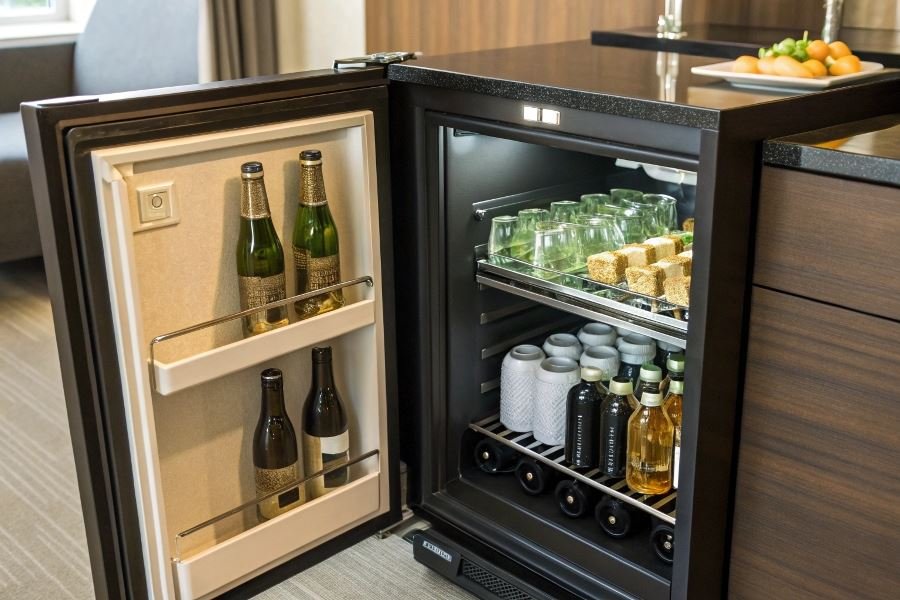
Remember the last time you hesitated before grabbing that $8 bottle of water from a hotel mini-bar? That moment of consumer indecision represents billions in potential revenue for the hospitality industry—revenue that smart mini-bars are now capturing with remarkable efficiency.
Smart mini-bars with integrated accounting systems represent the hospitality industry’s answer to inventory management challenges that have plagued hoteliers for decades. Unlike their conventional predecessors—those silent refrigerators that required manual checking and generated countless billing disputes—today’s intelligent units automatically track consumption, process charges, and provide real-time inventory data to management systems.
The evolution has been swift but purposeful. Traditional mini-bars emerged in the 1960s as simple convenience offerings. By the 1990s, rudimentary sensors appeared, but reliability issues persisted. The true transformation began around 2015 with the integration of IoT technology, creating systems that not only track consumption but analyze purchasing patterns and integrate seamlessly with property management software.
The adoption curve tells a compelling story: While only 12% of luxury hotels utilized smart mini-bar systems in 2018, that figure has jumped to nearly 47% in 2025, with mid-tier properties following suit at an accelerating pace. The trend reflects both technological maturation and compelling ROI metrics—hotels report average revenue increases of 22% and labor cost reductions of 30% after implementation.
What’s driving this shift? Beyond efficiency, it’s about enhancing the guest experience while simultaneously boosting profitability—a rare win-win in the competitive hospitality landscape.
Smart Mini-Bars That Boost Your Bottom Line
Hotel technology has evolved dramatically, transforming even the humble mini-bar into a revenue-generating powerhouse. Smart mini-bars with accounting systems represent a significant leap forward for property managers seeking operational excellence and increased profitability.
The hospitality landscape continues to embrace automation, and mini-bars haven’t been left behind. Smart mini-bars with accounting systems: advantages for hoteliers extend far beyond simple convenience, offering a comprehensive solution that addresses inventory challenges, revenue optimization, and operational efficiency. These intelligent units are revolutionizing how hotels manage in-room refreshments while delivering measurable ROI.
Never Run Out, Never Overstock
Automated inventory management stands as perhaps the most immediate benefit of smart mini-bar systems. Traditional mini-bars require manual checking—a tedious, error-prone process that often results in:
- Understocked items frustrating guests
- Overstocked perishables leading to waste
- Inaccurate billing creating guest disputes
Real-time monitoring changes this equation entirely. Systems like the Bartech automatic mini-bar use weight sensors and door switches to detect consumption instantly. When a guest removes an item for more than 30 seconds, the system records it automatically.
The days of clipboard-wielding staff checking each room are over.
This technology creates a digital inventory dashboard showing exactly what needs restocking and where. Housekeeping receives precise lists of which rooms need which items, eliminating guesswork and reducing restocking time by up to 70%.
Turn Consumption Data Into Dollars
Smart mini-bars transform random snack selections into actionable business intelligence through sophisticated analytics.
| Revenue Optimization Method | Traditional Mini-Bar | Smart Mini-Bar |
|---|---|---|
| Pricing Strategy | Static, rarely updated | Dynamic, adjustable by season/occupancy |
| Product Selection | Based on assumption | Data-driven by consumption patterns |
| Promotion Effectiveness | Unmeasurable | Precisely tracked and quantified |
| Upselling Opportunities | Limited | Targeted based on guest preferences |
These systems from providers like Minibar Systems allow hoteliers to implement dynamic pricing strategies based on:
- Day of week patterns
- Seasonal demand fluctuations
- Special event pricing
- Room category differentiation
The consumption analytics reveal which items perform best in which room types, allowing for customized stocking that maximizes revenue per available room (RevPAR).
Cut Costs While Improving Service
The operational efficiency improvements delivered by smart mini-bars create a compelling financial case. Labor costs—often a hotel’s largest expense category—see significant reduction through:
- Automated consumption tracking eliminating manual checks
- Targeted restocking routes reducing wasted movement
- Integrated billing systems preventing revenue leakage
- Maintenance alerts enabling proactive service
Minibar Systems estimates labor savings of 2-3 hours per day for properties with 100+ rooms. When integrated with property management systems like Opera, these smart units automatically post charges to guest folios, eliminating billing errors and reducing checkout disputes.
The maintenance component shouldn’t be overlooked. Smart systems monitor refrigeration performance, alerting maintenance before units fail completely—preventing both guest dissatisfaction and costly emergency repairs.
By transforming mini-bars from afterthoughts into data-driven profit centers, these intelligent systems deliver measurable advantages across inventory management, revenue optimization, and operational efficiency—making them an increasingly essential investment for forward-thinking hoteliers.
Turning Mini-Bars into Profit Centers: Implementation Roadmap
Smart mini-bars represent a significant shift in hotel amenity management, but their true value emerges only with strategic implementation. Let’s dive into how hoteliers can maximize returns while minimizing disruption.
Seamless System Integration
The most successful smart mini-bar deployments begin with thoughtful integration into existing hotel infrastructure. Property Management Systems (PMS) like Oracle OPERA and Protel now offer dedicated APIs specifically designed for mini-bar connectivity.
Integration complexity varies significantly:
- Basic integration: Simple charge posting to guest folios
- Intermediate: Inventory management and restocking alerts
- Advanced: Predictive analytics and personalized guest offerings
The technical architecture typically requires:
Smart Mini-Bar → Gateway Device → Hotel Network → PMS/Accounting SystemCritical consideration: Ensure your hotel network infrastructure can support additional IoT devices without compromising bandwidth for other guest services. Many properties underestimate the networking requirements, leading to intermittent connectivity issues that undermine the entire system.
The Numbers Behind the Investment
Smart mini-bars require significant upfront capital, but the ROI timeline is more favorable than many hoteliers realize.
| System Type | Average Cost Per Room | Typical Payback Period | Key ROI Drivers |
|---|---|---|---|
| Basic RFID | $300-450 | 18-24 months | Labor reduction, theft prevention |
| Weight-sensing | $500-700 | 14-20 months | Increased accuracy, real-time monitoring |
| AI-powered | $800-1,200 | 10-16 months | Personalization, dynamic pricing, predictive stocking |
The most dramatic financial improvements come from:
- Labor cost reduction: 70-85% decrease in mini-bar checking time
- Billing accuracy: Elimination of disputed charges (typically 3-5% of traditional mini-bar revenue)
- Inventory shrinkage: Reduction from industry average of 21% to under 5%
- Consumption increase: 18-30% higher usage rates through personalization and availability guarantees
The highest-performing properties report complete system payback in under 12 months when implementing comprehensive staff training alongside technical deployment.
Human Elements of Implementation
Technology alone doesn’t guarantee success. The human factors prove equally critical:
Staff Training Best Practices
- Tiered training approach: Different depth for housekeeping vs. front desk vs. management
- Hands-on troubleshooting sessions: Staff should experience and resolve common issues before guest encounters
- Regular refreshers: Quarterly micro-training sessions (15-20 minutes) maintain proficiency
- Champions program: Designate tech-savvy staff members as system experts
Guest Communication Strategies
The most successful implementations include:
- Pre-arrival messaging: Digital introduction to the smart mini-bar concept
- In-room digital or print guides: Simple, visual instructions with QR codes for video tutorials
- First-impression focus: Ensure first interaction is intuitive to build confidence
Implementation wisdom: Hotels using Bartech systems report that properties allocating at least 15% of project budget to staff training see 40% faster adoption rates and 22% higher guest satisfaction scores compared to technology-focused implementations.
The transition to smart mini-bars represents more than a technology upgrade—it’s a service model transformation that requires equal attention to systems, finances, and people to deliver its full potential.
Discover how smart mini-bars with integrated accounting systems revolutionize hotel operations, boosting profits through automated inventory management, real-time monitoring, and reduced labor costs while enhancing the guest experience.
Discover how smart mini-bars with integrated accounting systems revolutionize hotel operations, boosting profits through automated inventory management, real-time monitoring, and reduced labor costs while enhancing the guest experience.



